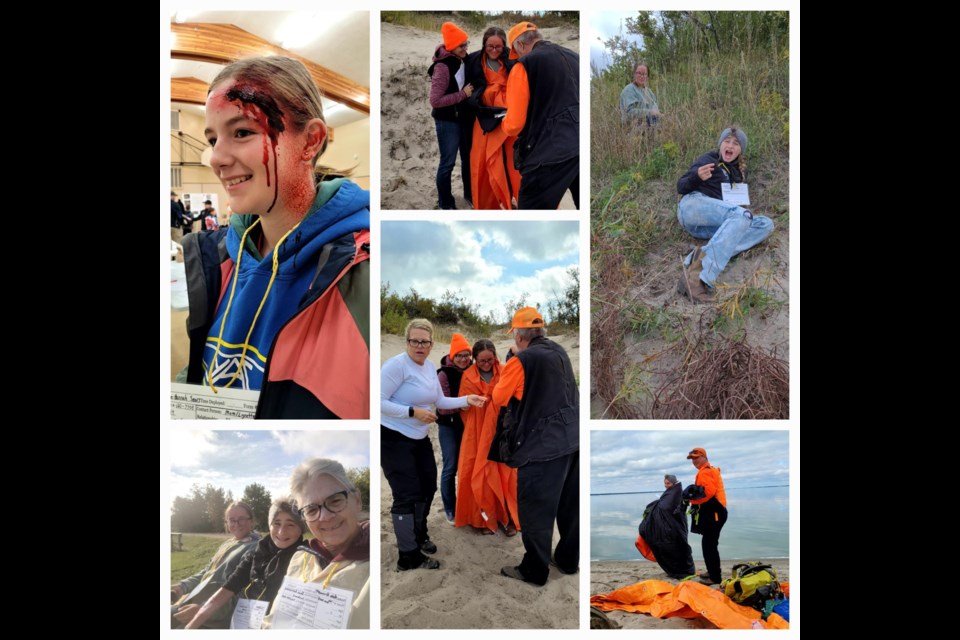GOOD SPIRIT LAKE — A multi-jurisdictional search exercise (MJSE) was held at Good Spirit Lake and Provincial Park from Sept. 16-18, and people from the southeast were involved.
"We do this annually, but this is the first provincial training exercise since COVID," said Dustin Brears, vice-president of Parkland Search and Rescue.
Search and rescue teams from across the province attended the exercise. Four Southeast Saskatchewan Search and Rescue (SESKSAR) chapter members were involved, including president Katia Bigney, Mickey Quigley, Pat Ross and Sofia Paulson.
"With responders and volunteers we're at about 125 people," said Brears. “We've got the entire RCMP search and rescue team here, we have EMS, local fire, Sask. Public Safety — a whole bunch of emergency organizers."
Brears said the exercise was based on a conceivable disaster scenario.
"We grouped them all together and given them a tornado scenario, and they need to manage through that scenario … ultimately find some missing people throughout the day, and hopefully rescue them successfully," said Brears. "[According to the scenario], the tornado went through the golf course, through the provincial park, across the lake and wiped out Burgis Beach.”
The fire, search and rescue, RCMP and all the other organizations had to work together to manage the immediate casualties. Later in the day the focus was on locating people that were reported missing. That's where the main search began as SAR volunteers were going out in a structured way, looking for missing individuals.
"A tornado in this area is a very real possibility, so it brings attention to the first responders who may be arriving at a scene like that," said Brears, “It lets them know the terrain, it lets them know the local community and it gives them an idea of what they're walking into."
Both seasoned veterans and people new to search and rescue partook in the training.
“We try to put those seasoned veterans in key roles so that the up and comers can learn at this exercise. If they make mistakes here that's okay," said Brears.
“We were kind of thrown together. We didn't just stick with our SESKSAR team,” Quigley shared for his experience. “That way we got to know other people and got introduced to all the other members that we could be working with in the future.”
It was the first time Quigley partook in a multi-jurisdiction mock training. He said the experience was really interesting and useful.
“It was our job along with other agencies like fire and police and EMS, that we would go through the Good Spirit area and look for people that had been reported missing or that just hadn't been seen after the tornado had gone through,” Quigley shared. “It was very interesting and very real. They had hired lots of volunteers to go out and play victims or play lost people and patients in that. It was a great learning experience.”
SESKSAR, as a chapter under the Search and Rescue Saskatchewan Association of Volunteers (SARSAV), was formed in 2019 to serve the southeast corner of the province. Due to the pandemic, most local novice searchers didn’t have much exposure to big training until now. And Quigley said the MJSE was indeed very helpful to sharpen and progress participants’ skills.
“It gave me a whole lot of knowledge. I got to work with people from different chapters that have been around for a while. [Parkland SAR] that kind of set this all up and gave us lots of information. I also got to network a lot with the Regina Search and Rescue chapter. Our chapter here is more into rural searching, so I picked up there a lot of information about urban searching through the Regina and Saskatoon chapters. And then just network with other ones too,” Quigley shared.
The weekend wasn't limited to learning about disaster scenarios. Participants also debriefed the big scenario, and also partook in bear safety training, as well as critical incident stress management and radio efficiency.
Before COVID-19 hit, multi-jurisdictional training was held twice a year, in the spring and in the fall. And Quigley said he is looking forward to future training opportunities.
“These MJSEs, now that I've attended one, I think it's a great way that not just our chapter, but all the other chapters throughout the province can get together and we get introduced to each other in a relaxed environment. Most times we might be thrown together on a search, especially this last year with how many we had province wide. And this is just the way that we can get to know each other before we're thrown into a situation where we have to go out and be all serious and provide a search effort,” Quigley said.
For more information on opportunities with SARSAV visit their sarsav.ca website.





